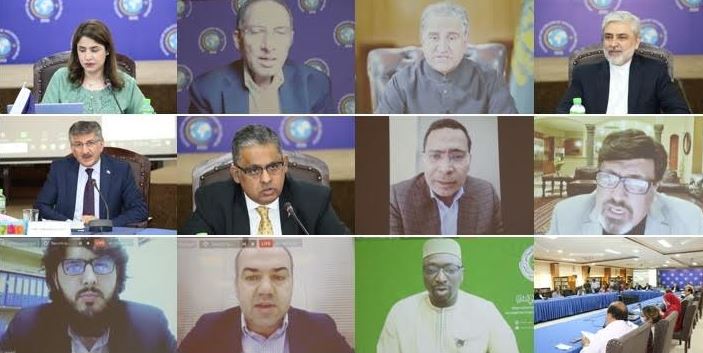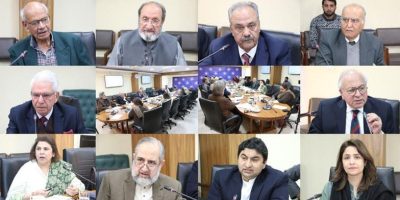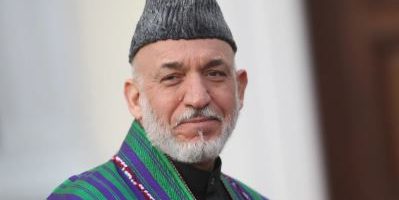CAMEA organizes discussion ahead of OIC summit

ISLAMABAD, MAR 17 /DNA/ – The Centre for Afghanistan, Middle East and Africa (CAMEA) at the Institute of Strategic Studies (ISSI) organized a roundtable on “OIC through the Decades: Challenges and Opportunities Ahead”, in collaboration with the Middle East Monitor (MEMO). The roundtable was moderated by Ms. Amina Khan, Director CAMEA. Director General ISSI, Ambassador Aizaz Ahmed Chaudhry gave the welcome remarks.
Speakers on the occasion included Shah Mahmood Qureshi, Foreign Minister of Pakistan, Dr. Daud Abdullah, Director Middle East Monitor (MEMO) UK, Professor Dayto Dr. Kohtou Moustapha Sano, Secretary General International Islamic Fiqah Academy Jeddah, Ambassador Rizwan Saeed Sheikh,Pakistan’s Permanent Representative to the OIC, Mr. Mustapha El Khalfi,Moroccan Politician (Justice and Development Party), H.E. Hamid Abbas Lafta, Ambassador of Iraq to Pakistan, Mr Khalid Pashtoon,Former Member of Afghanistan’s Parliament, H. E. Mr. Seyed Mohammad Ali Hosseini, Ambassador of the Islamic Republic of Iran in Pakistan, Mr. Farrukh Iqbal Khan, DG ED&OIC MOFA, Dr. Veysel Kurt, Associate Prof. Veysel Kurt. Istanbul Medeniyet University and Mr. Bahlol Javed, Research Fellow for Center for Strategic Studies, MoFA, Kabul.
While giving her remarks, Ms. Amina Khan, stated that more than a half a century ago, the Organization of Islamic Cooperation (OIC) was established as the collective voice of the Muslim world. Its objective has always been to ensure and safeguard Muslim economic and political interests and lessen all challenges faced by the Muslim Ummah. She further said that as momentous changes have swept across the Muslim world over the past decade, the OIC has emerged as an important voice defending the dignity and rights of its members. Palestine and Kashmir are the two critical issues of the Islamic World.
Over the years, Pakistan has been closely engaged in supporting cooperation amongst member states and advocating for equitable solutions for various issues faced by the Muslim community. Pakistan has presently been very proactive in pursuing a crusade against Islamophobia, and as a result of Pakistan’s efforts, the UNGA has declared March 15 as the international day to combat Islamaphobia, she opined.
Ms. Khan also said that Pakistan also hosted the 17th extraordinary session of the OIC Council of Foreign Ministers on the situation in Afghanistan during which Pakistan proposed a framework to help solve the ongoing humanitarian crisis, which included the creation of a structure to channel humanitarian as well as financial support to Afghanistan in this time of need.
Ambassador Aizaz Ahmed Chaudhry, in his welcome remarks said that Pakistan’s commitment to OIC has been integral part of Pakistan’s foreign policy and the country is deeply attached to Muslim voices all over the globe. Therefore, during the decolonization movement, Pakistan was very active and for the Palestine cause, Pakistan has always stood very firm. Talking about the Arab Spring, he went on to say that Pakistan was respectful and has a very abiding commitment to the Muslim world and has treated it as of highest value. Pakistan’s commitment to the Palestinian cause is evident from the fact that it has not recognized Israel. Pakistan’s full commitments to the causes of the Islamic world are evident by its efforts to combat Islamophobia he opined.
Dr. Daud Abdullah, said that he mentioned the attempts by Israel to change the demography of Jerusalem. He shed light on the challenges faced by the OIC and that the OIC will have to conduct itself to meet the challenges of the contemporary world. He further said that it is heartening that the OIC is the second largest organization after the UN and it is a matter of pride for the Muslim world that we have an organization which brings together the Muslims from around the globe. Dr. Abdullah went on to say that the OIC will remain an institution of government; it must also engage with the civil society and ensure greater cooperation. The issue of Islamophobia is of utmost concern for the Ummah he concluded.
Expressing his views, Foreign Minister, Shah Mahmood Qureshi, said that the OIC as an organization has emerged as an important voice defending the dignity and rights of its member states. Prompted by the tragic event of the arson attack on Al Aqsa, over more than five decades ago, twenty five Muslim countries got together to give practical shape to their resolve to safeguarding collective interests, to promoting common values and advancing shared objectives. Therefore, the OIC is the embodiment of the age old ideas of Islamic solidarity inherent in the notion of the Ummah. It is a concrete manifestation of the hopes and aspirations of Muslim states to act in unison and have a collective voice on world stage and to have enhanced salience in global affairs. Keeping in mind the turmoil in the Muslim world over the past few decades, OIC’s existence is based on the idea that there is an ideological commonality among its member states that is beyond any differences.
OIC as an organization has been steadfast and has taken a principled stand on two of the longest standing disputes of the Muslim World – Palestine and Kashmir. In both cases, OIC’s support and stand on these disputes has been a source of strength for the people of Palestine and Indian occupied Kashmir, who continue to struggle against the forces of occupation. He further said that For Pakistan, the OIC has played a significant role in raising the issue of Kashmir which has been one of the longest standing items on the OIC agenda since the 1990s.
The OIC member countries are putting their weight behind the issue of Kashmir in the UN, and as the second largest international organization, it is making the Kashmir cause relevant in the international arena. The OIC has been viewed as a political entity; however, it is time that the member countries see it as an economic organization as well and gain from it in terms of trade by exploring prospective markets in other member countries.
Dr. Dayto Kohtou Moustapha Sano said that the OIC is a source of inspiration for the Muslims the world over and over the years it has made tremendous achievements. He went on to highlight the numerous institutions the OIC has established such as the Islamic Solidarity Fund (ISF). He went on to say that there is a need to strengthen the collective voice of the Muslim Ummah and this type of intellectual engagement will be helpful for the political leadership of all member states. He hoped that soon the dream will become a reality where members of the OIC will have a single passport and currency, when all borders are eliminated and where trade between the Islamic Ummah will take precedence. He appreciated Pakistan for its untiring efforts to help the Muslim Ummah, contributing its utmost to pressing challenges confronting the Muslim Ummah, and highly valued Pakistan’s proactive role in spearheading efforts which led to the UNGA resolution marking March 15 as the international day to combat Islamophobia.
During his remarks, Ambassador Rizwan Saeed Sheikh, stated that the OIC is the second largest organization yet is was essential to strive for Islamic solidarity. He mentioned that the organization is grappling with issues like Islamophobia and many others but in economic terms it has a lot to do. The OIC has dealt with issues like Islamophobia and terrorism and continues to evolve. He further said that for the OIC, Palestine and Kashmir are the two oldest issues which need to be taken to another level. He said the OIC is living up to its potential, however, there are several areas where the OIC member states can cooperate and this includes economic cooperation and further convergence on political agendas would be incremental in making the organization stronger and more effective. Pakistan would be looking at all these opportunities he concluded.
H.E. Hamid Abbas Lafta, while appreciating the efforts made by Pakistan in supporting peace, issues concerning the Islamic world said that Pakistan has been shouldering the task of countering the phenomenon of Islamophobia that targets Islamic values and sacred religious symbols targeting our Noble Prophet Muhammad (SAW). OIC called during all occasions and at all international forums, the need to respect all religions and sects, rejecting all types of intolerance and any behavior that would fuel the fire of sedition and violence. The interest of the OIC is not limited to one aspect or to a single issue, but rather provides the same importance to all other issues in the Islamic world. We lack time to mention all the activities and positions of the Organization, but we must refer to some of them like the solidarity of the Organization with Azerbaijan, the Turkish Cyprus state, the issue of the disputed region of Jammu and Kashmir, and the Muslim Rohingya minority has too captured the attention of the organization and all the member states, he concluded.
Mr Khalid Pashtoon said that currently, the OIC has 57 members and Afghanistan is one of the earliest members having joined in 1969. These 57 member states represent nearly 2 billion people of the world’s total 7.7 billion total population. In rough numbers this is about one fourth of the world. He went on to say that collectively, the economies of these 57 states contribute to about 10% of the world’s total GDP. While shedding light on the role of the OIC in Afghanistan, he said that members of the OIC have played a very vital role in averting a major humanitarian, financial, diplomatic and some might argue a security catastrophe. The OIC member countries were the first to pledge aid towards a humanitarian fund and were the first to organize a formal meeting in Pakistan. The OIC member countries took a lead in exhibiting support for the health and well-being of millions of Afghans who had little or no means of getting food, shelter and medicine—especially throughout the harsh and bitter winter. The OIC member countries have even pledged support for completing development projects which have been left without a budget over the past seven months. In the case of Afghanistan, the OIC has set a new standard in unifying countries to prioritize human dignity and humanitarian needs above politics, he concluded.
H. E. Mr. Seyed Mohammad Ali Hosseini opined that we all know that the main reason behind the formation of such an organization 53 years ago and the gathering of officials of 57 Islamic countries in different periods, has been defending the Palestinian cause and Islamic sanctities and supporting the legitimate rights of the noble people of Palestine against the apartheid and occupier regime of Israel. He went on to say that the occupying regime of Jerusalem enjoys the unprecedented support of the US government, and especially differences in the Islamic Ummah help in diverting the attention of world public opinion from the issue of Palestine as the first issue of the Islamic world and to replace it with other priorities. In such circumstances, it is obligatory for us, inspired by the teachings of the Holy Quran and the Sunnah of the Holy Prophet of Islam (PBUH); to put aside differences, strengthen the spirit of Islamic brotherhood. OIC is the second largest international organization after the United Nations and covers more than one-fifth of the world’s population. Therefore, it can be an important and influential organization in global policymaking. Moreover, the member countries of the organization have abundant natural resources and capable manpower, which through an optimal management can act as a driving force for the development of Islamic countries.
Dr. Veysel Kurt was of the opinion that the world is fragmented than ever before and the new normal is not exceptional. The UN is ineffective in addressing global crises and a global crisis is feeding the weakness of collective action. He went on to say that the OIC must change its procedures and make itself more robust, by focusing on how to grapple with new challenges. He said that Afghanistan is a real problem and the OIC must help in the reconstruction of institutions in Afghanistan. Talking about the role of Turkey, he said that the Turkish President Erdogan has always made a call to the Muslim world against injustices. He concluded by saying that the OIC must become more proactive.
Mr. Mustapha El Khalfi, emphasized that amidst multiple crisis in this critical time we need to refocus on the priorities of the Muslim world, one of which is the situation in Al-Quds. He highlighted how Israel is now taking legal measures to change the nature of Al-Quds. The Muslim countries should mobilize forces against this aggression. It is time to develop a new discourse on this issue and hold accountable all countries responsible if they do not defend the legal rights of the Palestinian people. We need to develop a platform to fight this policy of discrimination, he concluded.
Mr. Bahlol Javed, while speaking about the role of the OIC said that it is understood that the OIC has not played a proactive role, however, solidarity of the Muslim Ummah towards Afghanistan is evident. The opening of the OIC mission in Afghanistan is a positive step and the collective determinant is evident. He went on to say that OIC has a huge potential although there are important issues that still require closer attention. Afghanistan looks to Islamic countries for support and the OIC has the potential to help the country in its ongoing challenges. The country requires help in enhancing its education system, capacity building and much more, he said.
The roundtable ended with an interactive question and answer session.
Related News

ISSI roundtable discusses Afghanistan’s implications for Pakistan
ISLAMABAD, FEB 13 /DNA/ – The Centre for Afghanistan, Middle East and Africa (CAMEA) atRead More

Karzai seen as key figure for political reconciliation in Afghanistan
Shamim shahid PESHAWAR: Tensions between Pakistan and Afghanistan continue to deepen, with analysts warning thatRead More


Comments are Closed